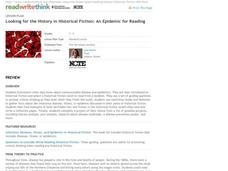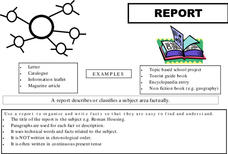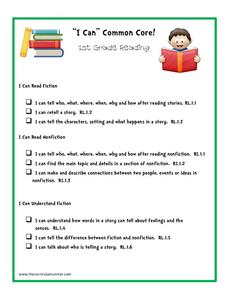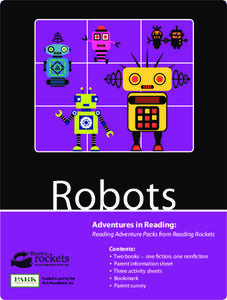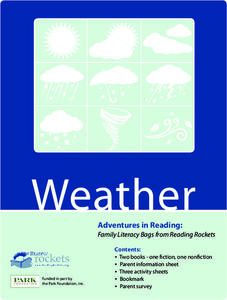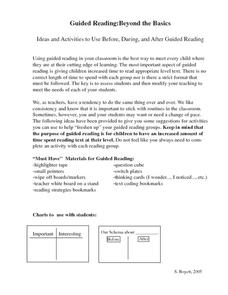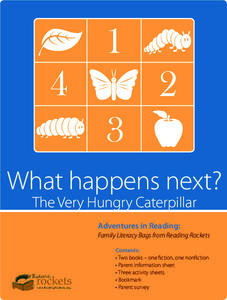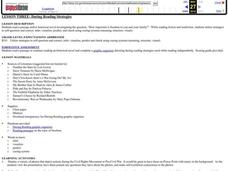Curated OER
Civil Disobedience from Antigone to Hunger Games
Study the concepts and practice of civil disobedience through fiction and nonfiction texts.
ReadWriteThink
Looking for the History in Historical Fiction: An Epidemic for Reading
Combine informational reading skills with fictional text in an innovative historical fiction lessons. After reading a fictional text related to diseases, class members read non-fictional text to gain knowledge about specific infectious...
Curated OER
Comprehension Strategy Instruction: Questioning
Providing learners with a solid armory of reading strategies is a good way to help them build better reading comprehension. The teacher will model how to use a questioning checklist to better understand what she is reading. Pupils will...
Curated OER
Fiction vs. Nonfiction
Students explore fiction and nonfiction writing. They identify the elements of fiction in a short story and identify the criteria necessary in a nonfiction piece. Students distinguish the author's purpose in an expository text,...
Curated OER
Non Fiction Posters
A set of very useful posters (in PDF) describing different types of non-fiction texts is here for you. While there isn't an activity, per se, in these worksheets, they could be used as a handy reference for learners who are engaging in...
Curated OER
“I Can” Common Core! 1st Grade Reading
I can read and understand fiction and nonfiction texts! Here is a great checklist that highlights 19 first grade Common Core reading standards. The resource is three pages long. Pages one and two focus on comprehension for fiction and...
Film Foundation
To Kill a Mockingbird: What Is a Movie?
The challenge film makers face when creating a film based on a novel or nonfiction text is the focus of a interdisciplinary resource that uses To Kill a Mockingbird to teach viewers how to read the visual images of film. A...
Curated OER
Blending Fiction and Nonfiction to Improve Comprehension and Writing Skills
Students explore a content area by reading both fiction and nonfiction texts on the topic. They do more research online about the topic. After comparing the texts, they create their own written original work, using both narrative and...
PBS
Reading Adventure Pack: Robots
Two activities work with a fiction and nonfiction book about robots‚—Robot Dreams by Sara Varon and Robot by Roger Bridgman. Scholars read each story, then build a robot out of found objects, examine robot sensors, and search for...
PBS
Reading Adventure Pack: Weather
A reading adventure pack, featuring a fiction and nonfiction book focuses on the weather. Scholars read Cloudy with a Chance of Meatballs by Judi Barrett and Seymour Simon and then complete three creative activities. Participants craft...
PBS
Reading Adventure Pack: Birds
A Reading Adventure Pack takes a close look at birds. After reading a fiction and nonfiction book, scholars craft a thaumatrope, begin a birding journal using their sense of sight and hearing, and build a model bird using supplies from...
National Council of Teachers of English
Timelines and Texts: Motivating Students to Read Nonfiction
With the emphasis on incorporating more nonfiction in language arts classes the question arises about how to design activities that motivate kids to engage with informational text. How about an assignment that asks class members to...
Ideas From Suzi
Guided Reading: Beyond the Basics
Elevate children's reading comprehension skills with this collection of guided reading resources. From paper dice with basic comprehension questions printed on them to a system for using sticky notes to identify key...
K20 LEARN
Writing An Argumentative Paragraph: Argumentative Writing
Learning how to craft a cogent argument based on a solid claim, supported with evidence and solid reasoning, is an important life skill. Teach middle schoolers about argumentative writing with a lesson plan asking them to analyze the...
Curated OER
Comparing and Contrasting Fiction and Nonfiction Using Graphic Organizers
Students compare and contrast fiction and non-fiction selections. In this writing skills lesson, students use different forms of graphic organizers to compare "The Three Little Pigs," to Wiesel's Night.
Curated OER
Irony in Poetry and Prose (Fiction and Non-fiction Texts)
Middle and high schoolers examine the impact of irony in poetry and prose. In this figurative language lesson plan, they read instructor-selected literature and identify uses of irony. Then they discuss how irony enhances literature.
Great Schools
Different Types of Writing
What type of writing is this? Learners read a brief introduction to various types of text: instructions, explanations, poems, folk tales, novels, informative, and arguments. The introduction doesn't explain these, so...
PBS
Reading Adventure Pack: Money
Money is the topic of a reading adventure pack. Third graders read two books—one fiction, one non-fiction—and complete a series of activities. Learners draw an item they wish to save money for, examine coins to start a collection, and...
PBS
Reading Adventure Pack: What's Next? The Very Hungry Caterpillar
A series of hands-on activities follows a reading of The Very Hungry Caterpillar by Eric Carle. Learners create a paper collage to explore the beginning, middle, and end of days of the week, numbers, and more. They grow a butterfly...
Curated OER
Using Details From The Text
Begin this expository writing activity by reading a non-fiction book of your choice and modeling expository writing. The plan suggests The Trip of a Drip by Vicki Cobb but notes that other texts will work. Learners then choose a...
Curated OER
Creating a Science Fiction Story
As the culminating activity in a unit study of science fiction, young writers demonstrate their understanding of the genre by producing their own graphic novel. After deciding on the main elements of their story, individuals use a comic...
Curated OER
Muestra que occurió
Pair this graphic organizer with any sort of text. It could be used with fiction or nonfiction texts. As they read, Spanish pupils record the who, what, when, where, and why.
Great Schools
A Questionnaire: What Do You Like to Read?
What do your fifth graders know about types of fiction, nonfiction, and poetry? Find out as they fill out this questionnaire that requires them to list authors and texts that exemplify each genre. Not only will you be able to assess what...
Curated OER
During Reading Strategies
"How important is freedom to you and your family?" The guiding question becomes much more powerful after your class reads and responds to a passage from a historical novel. While reading the passage, they complete a graphic organizer...



